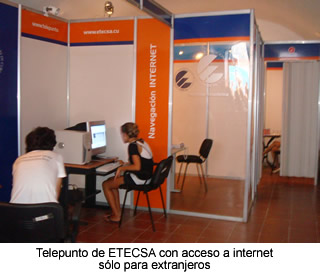
As I look at a map of Cuba, I can’t help but wonder about how, in the 21st century, an island that is so close to the country which exhibits the greatest digital advancement, can be traveling in the opposite direction. From Villa Clara to the tip of Maisi there are only two hotels which offer internet service for Cubans who do not have foreign passports, in other words for Cubans with ID cards. These locations are found in Santiago de Cuba and Guantanamo, and their rates are 6 CUC per hour. They have very low connectivity and some sites, which the government considers harmful, are blocked.
The attentive receptionists in the famous tourist spot of Guardalavaca in Holguin explain to me that in all the dozens of hotels and Bungalow Villas of my province I do not have the opportunity to connect to the internet if I’m not staying in these lodges. But, if I were to be checked in to one of these resorts, with the magical passport and foreign residence card, I’d have to pay no less than 50 CUC for just one day.
There is also no luck in the hotel chains known as Club Amigos, Las Brisas, or Costa Verde, which are symbols of international hostels which particularly exclude Cuban citizens from any rights to enjoy warm sands, computer rooms, or basic cafeteria services.
Every city on the island has Points of Tele-Selection with the ETECSA companies. They are commercial offices which also reserve the right to only admit people who possess some documents that prove foreign citizenship or residence. However, about a little over a year ago they opened a locale which has proven to be surprisingly busy. In them, you can see a long line of guys and girls who await their turn to exchange e-mails with foreign friends whom they have met in the hotels previously mentioned.
Let me explain: For 1 CUC they are allowed to open an e-mail account from a national server that will not have well known extensions like g-mail or yahoo, but which will have the .cu extension, from which they will only be able to read and respond to their almost always flirtatious remarks. There, they cannot use any sorts of devices like flash drives or CDs. For 0.50 cents CUC they can spend an hour trying to exchange messages with the outside world under very strict vigilance on the part of the information functionaries which ETECSA and the G2 position there to watch over the users. Those girls could pass with their foreign boyfriends and friends to hotels, make them spend a fortune on internal services, but when they leave, they have to return to the tourist apartheid.
The game is tight, as the saying goes. Now, Cubacel holds the right to allow, or not to allow, people to use Twitter through cell phones in Cuba. Those of us who are nonconformists and chose to protest, are also bound to lose this time around.
Translated by Raul G.
September 1, 2010
